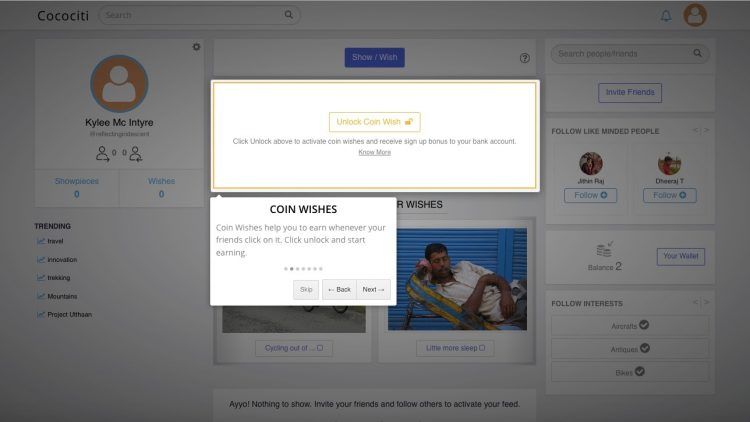
Cocociti and Mickey Mouse have quite a bit in common. Photo credit: skyseeker.
Around five months ago, when co-founders and former secondary school classmates Jithin Raj and Dheeraj T realized their P2P lending startup wasn’t working out, they decided to pivot into the business of granting wishes.
They decided to pivot into the business of granting wishes.
Their then-rental-company Cocociti sprung out of the co-founders’ mutual love of collaboration – collaboration between people, and collaboration between people and their computers. Their problem was developing trust among their users.
“People were not willing to share products to a stranger,” Jithin, a former Tata Consultancy Services engineer, tells Tech in Asia. Unlike Airbnb, which offers Host Protection Insurance for up to US$1 million in 26 countries, Cocociti just didn’t have those kinds of resources.
They didn’t own any of the items being rented, either. “[That’s] not really P2P,” Jithin explains, pointing to companies like car rental business Zoomcar that own part or all of their inventory.
Three months later, he and Dheeraj ventured into the wish economy.
Here’s to the dreamers

Jithin Raj, co-founder and CEO of Cocociti. Photo credit: Cocociti.
Cocociti – a name created from the phrase “Collaborative Consumption of City and Citizens” – is a social network through which people can post their wishes and grant them through their connections. A glance at the site’s homepage shows wishes as concrete as an iPhone 7 and as abstract as “being a morning person.”
People are supposed to leverage their networks to help them reach their goals. For example, a person who wants an iPhone 7 can ask her networks if they know anyone selling a phone for a good price. Their networks can also help her start and keep on a saving plan so that she can get her hands on enough money to buy one from a store. A person struggling with an early morning alarm clock can join groups of early risers and get tips on easing into an up-with-the-sun lifestyle.
Cocociti will also offer suggestions to “add value” to a wish.
Cocociti will also offer suggestions to “add value” to a wish. If a person wants a bike, for example, the startup will offer rental suggestions as well as different payment or saving plans to help a user finance the two-wheeler.
Advertisement-based help offers may later may be introduced to help the startup monetize. Right now, though, they’re testing the waters – the new site hasn’t officially launched but is open for use.
The site features a login process much like Facebook. A built-in wallet is connected when you connect your mobile number to your profile. That helps with “Coin Wishes,” or wishes that earn you money per like you get on your profile – about US$0.01 per like, with a maximum payout for 50 likes.
For those 50 likes, Jithin explains, you’d need at least 50 followers, something that he hopes will bring in more sign-ups. The money acts “like real cash in the bank account, no bullshitting.”
Active wishing

Dheeraj T, co-founder and CTO of Cocociti. Photo credit: Cocociti.
I decided to test my own wishes against the site. In two minutes, I’d created my account and faced a list of popular wishes Cocociti suggested for me, including paragliding, hiking Kilamanjaro, and trying sushi. I added taking a solo trip and getting a little more sleep to my list. Then, I added an original wish – to exercise four times a week – and added that to my wishlist, along with a required picture. In return, I received US$0.01 as part of a first-time wisher gift (I received US$0.03 for signing up). Then, I added a couple of suggestions from the list of “like-minded people” Cocociti offered to me and set to work liking some of their wishes – to earn them some cash.
The process, overall, was pretty lonely. No one I knew was on the platform, yet, so I messaged a few using the network’s “invite” option. However, I got a rush of productivity and accomplishment from listing my wishes and New Year’s resolutions, then seeing them artfully arranged on my page, like a checklist.
The process, overall, was pretty lonely. However, I got a rush of productivity.
There are plenty of social networks out there currently, something that Jithin acknowledges. But while our Facebook and Instagram posts deal with things that are happening to us at that moment or some point in the past, there isn’t really a network that focuses on the future. Users can list their goals on Fitspiration accounts or post about their dream house on Pinterest, but Jithin wants to help people make those futures a reality.
The sheer success and breadth of social networks like Facebook and Instagram have made it hard for smaller social networks to break in. However, startups that deal with users’ To Do lists – and give them the resources to check off those tasks – have been popping up. Haptik uses an AI chatbot that acts like a personal assistant and organizes a person’s daily tasks and resources, like scheduling and placing orders. A motivational progress bar motivates people to complete their tasks. Hyperlocal dunzo uses a hyperlocal team that knows the ins and outs of Bangalore to get people what they need quickly.

Can a similar service work for crowdsourcing longer-term goals? Jithin and Dheeraj, the two-person team holding the startup together, think so. Jithin’s official title within the company is “Hustler,” in charge of business operations and the company’s vision. Dheeraj, the “Hacker,” handles all of the tech. The co-founders, who found themselves in debate competitions in school, found common ground and a mutual love of the same social causes. The move to wish-granting has brought their company back to its mission and roots in collaboration – and their faith in people to make that happen for others around them.
Converted from Indian rupees. US$1 = INR 68.10
This post The startup that’ll crowdsource your wishes and New Year’s resolutions appeared first on Tech in Asia.
from Tech in Asia https://www.techinasia.com/cocociti-startup-grants-wishes
via IFTTT
No comments:
Post a Comment